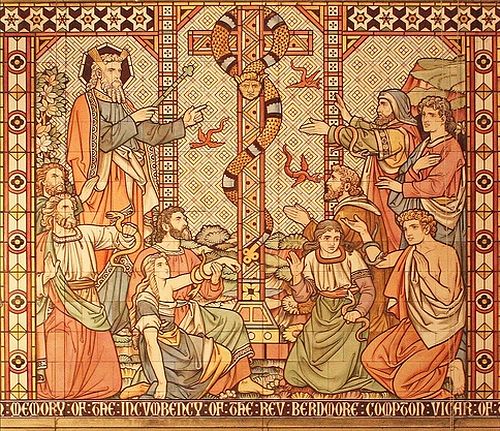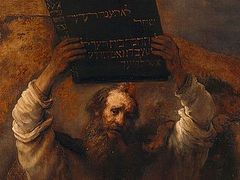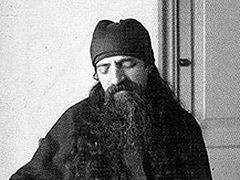That the power of the Holy Ghost in man’s heart is like fire; and, what things we need, in order to distinguish the thoughts that spring up in the heart; and concerning the dead serpent fixed by Moses at the top of the pole, which was a type of Christ. The Homily contains two dialogues, one between Christ and the evil one, Satan; the other between sinners and the same.

1. That heavenly fire of the Godhead, which Christians receive in their hearts now in this present world, that same fire that now ministers inwardly in the heart becomes outward when the body is dissolved, and recomposes the members, and causes a resurrection of the members that had been dissolved. As the fire that ministered on the altar at Jerusalem lay buried in a pit during the time of the captivity, and the selfsame fire, when peace came and the captives returned home, was renewed, as it were, and ministered in its accustomed manner,1 so now the heavenly fire works upon this body that is so near us, which after its dissolution turns to mire, and renews it, and raises up the bodies that had decayed. The inward fire that now dwells in the heart becomes then external, and causes a resurrection of the body.
2. The fire in the furnace under Nabuchodonosor was no divine fire, but a creature; but the Three Children, because of their righteousness, while they were in the visible fire, had in their hearts the divine and heavenly fire ministering within their thoughts and exerting its energy in them. That very fire showed itself outside them. It stood between them and the visible fire, and restrained it, that it should not burn the righteous, nor do them any manner of hurt. In like manner, when the mind of Israel and their thoughts were bent upon departing far from the living God and turning to idolatry, Aaron was compelled to tell them to bring their golden vessels and ornaments. Then the gold and the vessels, which they cast into the fire, became an idol, and the fire, as it were, copied their intention. That was a wonderful thing. They, secretly, in purpose and thought, determined upon idolatry, and the fire accordingly fashioned the vessels thrown upon it into an idol, and then they committed idolatry openly.2 As, then, the Three Children, having thoughts of righteousness, received in themselves the fire of God, and worshipped the Lord in truth, so now faithful souls receive that divine and heavenly fire, in this world, in secret; and that fire forms a heavenly image upon their humanity.
3. As the fire formed the golden vessels, and they became an idol, so does the Lord, who copies the intentions of faithful and good souls, and forms an image even now in the soul according to their desire, and at the resurrection it appears external to them, and glorifies their bodies within and without. But as the bodies of some are at this time decayed for a season, and dead, and dissolved, so also are their thoughts decayed by the action of Satan, and are dead to the life indeed, and buried in mire and earth; for their soul is perished. As, therefore, the Israelites cast the golden vessels into the fire, and they became an idol, so now the man has given over his pure and good thoughts to evil, and they have been buried in the mire of sin, and are become an idol. And what shall a man do to discover them, and discern them, and cast them out of his own fire? Here the soul has need of a divine lamp, even of the Holy Ghost, who sets in order the darkened house. It needs the bright sun of righteousness, which enlightens and rises upon the heart, as an instrument to win the battle.
4. That woman who lost the piece of silver, first lighted the lamp, and then set the house in order, and thus, the house being set in order and the lamp lit, the piece of silver was found, buried in dirt and filth and earth. So now the soul cannot of itself find its own thoughts, and disengage them; but when the divine lamp is lit, it lights up the darkened house, and then the soul beholds its thoughts, how they lie buried in the filth and mire of sin. The sun rises, and then the soul beholds its loss, and begins to recall the thoughts that were mingled among the dirt and the uncleanness. For indeed the soul lost her image when she transgressed the commandment.
5. Suppose there is a king, and he has goods and servants under him to minister to him, and he happens to be taken by his enemies and carried captive. When he is taken and removed from his country, his ministers and servants cannot but follow after him. Thus Adam was created pure by God for His service, and these creatures were given him to minister to his wants. He was appointed lord and king of all creatures. But when the evil word came to him, and conversed with him, he first received it by the outward hearing, then it penetrated through his heart, and took possession of all his being. When he was thus seized, creation, which served him and ministered to him, was seized with him. Through him death reigned over every soul, and defaced every image of Adam in consequence of his disobedience, so that men were turned and came to the worship of devils. Lo, the fruits of the earth, which were created good by God, are offered to the devils bread, and wine, and oil; and they set animals upon their altars; yea, they sacrificed their sons and their daughters unto devils.3
6. At this point comes He in person, who fashioned body and soul, and undoes the whole business of the wicked one, and his works accomplished in men's thoughts, and renews and forms a heavenly image, and makes a new thing of the soul, that Adam may again be king over death and lord of the creatures. In the shadow of the law, Moses was called the Saviour of Israel, because he brought them out of Egypt So now the true Redeemer, Christ, goes through into the hidden places of the soul, and brings it out of dark Egypt, and the heavy yoke, and the bitter bondage. He commands us, therefore, to come out of the world, and to become poor of all visible things, and to have no earthly care, but night and day to stand at the door, and wait for the time when the Lord shall open the closed hearts, and shall pour upon us the gift of the Spirit.
7. He told us therefore to leave gold, silver, kinsfolk, to sell that which we have and distribute to the poor, and to treasure it up and seek it in heaven. For where thy treasure is, there will thy heart be also.4 The Lord knew that in this quarter Satan prevails over the thoughts, to drag them down to anxiety for material, earthly things. For this reason God, in providential care for thy soul, told thee to renounce all, in order that even against thy will thou mightest seek the heavenly riches, and keep thy heart Godwards; for even if thou shouldest wish to return to the creaturely things, thou findest nothing visible in thy possession. Wiliest thou, nillest thou, thou art compelled to send thy mind to heaven, where thou hast treasured these things and laid them up; for where thy treasure is, there will thy heart be also.
8. In the law God commanded Moses to make a serpent of brass,5 and lift it up, and fix it upon the top of a pole, and as many as were stung by the serpents, when they fixed their attention upon the brazen serpent, obtained healing. This was done by way of a dispensation, in order that those who were held by earthly cares, and the worship of idols, and the pleasures of Satan, and all manner of ungodliness, might by this means to some extent look upward to things above, and gaining a respite from things below, might give heed to higher things, and again proceed from these to that which is highest; and thus advancing little by little to the higher and loftier kind, might learn to know that there is a Most Highest surpassing all the creation. So likewise He commanded thee also to make thyself poor, and to sell all and give to the poor, in order that after that, even if thou shouldest wish to sink down upon the earth, it might be impossible. Searching into thy heart, thou beginnest to commune with thy thoughts, "Inasmuch as we have nothing upon earth, let us be getting heavenwards, where our treasure is, where we have set up a business." Thy mind begins to uplift an eye to the height, to seek the things above, and in so doing to make progress.
9. What, however, is the dead serpent? The serpent fixed upon the top of the pole healed those that were stung. The dead serpent overcame the live ones. Thus it is a figure of the body of the Lord. The body which He took of the ever Virgin Mary, He offered it up upon the cross, and hung it there, and fastened it upon the tree; and the dead body overcame and slew the live serpent creeping in the heart. Here was a great marvel, how the dead serpent slew the live one; but as Moses made a new thing, when he made a likeness of the live serpent, so also the Lord made a new thing from the Virgin Mary, and put this on, instead of bringing with Him a body from heaven. The heavenly Spirit entered in and wrought in Adam,6 and brought him into combination with the Godhead, and put on human flesh, and fashioned it in the womb. As no serpent of brass was ever commanded by the Lord to be made in the world until Moses, so a new and sinless body was never seen in the world until the Lord. For when the first Adam transgressed the commandment, death reigned over his children without exception. So a dead body overcame the live serpent.
10. This wonderful thing is to the Jews a stumbling-block, and to the Greeks foolishness.7 But what says the apostle? But we preach Jesus Christ, and Him crucified, to the Jews a stumbling-block, and to the Greeks foolishness, but to us that are saved Christ the power of God and the wisdom of God.8 In the dead body is life. Here is redemption; here is light. Here the Lord comes to death, and discourses with him, and bids him bring the souls out of hell and death, and give them back to Him. Behold then, death, troubled at these things, goes in to his ministers, and gathers together all his powers; and the prince of wickedness produces the bond-deeds, and says, "See, these obeyed my words; see how men worshipped us." But God, who is a just judge, displays His justice here also, and says to him, "Adam obeyed thee, and thou didst take possession of all the hearts of him. Humanity obeyed thee. What is My body doing here? This is without sin. That body of the first Adam was under obligation to thee, and thou hast a right to keep the bond-deeds of it; but to Me all bear witness that I never sinned. I owe thee nothing, and all bear witness that I am the Son of God. Above the heavens came a voice and bore witness upon the earth, This is My beloved Son; hear Him9 John witnesses, Behold, the Lamb of God, which taketh away the sin of the world;10 and the scripture again, Who did no sin, neither was guile found in Him;11 and, The prince of this world cometh, and hath nothing in Me.12 And thou thyself, O Satan, bearest witness to Me, saying, I know Thee, who Thou art, the Son of God;13 and again, What have we to do with Thee, Thou Jesus of Nazareth? art Thou come to torment us before the time?14 There are three that bear witness to Me He that is above the heavens sends forth a voice; they that are on earth; and thou thyself. Therefore I purchase the body that was sold to thee through the first Adam; I cancel thy bonds. I paid the debts of Adam, when I was crucified and descended into hell; and I command thee, O hell and darkness and death, bring out the imprisoned souls of Adam." Thus the evil powers, stricken with terror, give back the imprisoned Adam.
11. But when you hear that at that time the Lord delivered the souls from hell and darkness, and went down to hell, and did a glorious work, do not imagine that these things are so very far from your own soul. Man is capable of admitting and receiving the evil one. Death keeps fast hold of the souls of Adam, and the thoughts of the soul lie imprisoned in the darkness. When you hear of sepulchers, do not think only of visible ones; your own heart is a sepulcher and a tomb. When the prince of wickedness and his angels burrow there, and make paths and thoroughfares there, on which the powers of Satan walk into your mind and thoughts, are you not a hell, a tomb, a sepulcher, a dead man towards God? There it was that Satan coined reprobate silver. In this soul he sowed seeds of bitterness. It is leavened with old leaven; a fountain of mire springs there. Well, then, the Lord comes into souls that seek after Him, into the deep of the heart-hell, and there lays His command upon death, saying, "Bring out the imprisoned souls that are seeking after Me, which thou detainest by force." So He breaks through the heavy stones that lie on the soul, opens the sepulchers, raises up the man that is dead indeed, brings out of the dark jail the imprisoned soul.
12. Just as if a man were bound hand and foot with chains, and some one came and loosed his bands, and let him walk free without interference, so the Lord looses from its bonds the soul that is bound with the chains of death, and lets it go, and sets the mind free to walk at ease and unhindered into God's air. Suppose a man were in the middle of a river in full flood, and overwhelmed by the water lay lifeless, drowned, with dreadful monsters all round him. If another man, who is not used to swimming, should wish to save the one who fell in, he too is lost, and is drowned with him. Clearly there is need of a skilled swimmer, an expert, to go out into the depth of the water of the gulf, and dive, and bring up the drowned man there among the monsters. The water itself, when it sees a man skilled and knowing how to navigate it, helps such a man, and bears him up to the surface. The soul, in the same way, has been plunged and drowned in the abyss of darkness and the deep of death, and is dead and parted from God among dreadful monsters; and who is able to go down into those secret chambers and the depths of hell and death, except that expert Workman who fashioned the body? In His own person He enters into two quarters, into the depth of hell, and into the deep gulf of the heart, where the soul with its thoughts is held fast by death, and brings up out of the darksome hole the Adam that lay dead. And death itself, through practice, becomes an assistance to man, like the water to the swimmer.
13. What difficulty is there to God in entering into death, or into the deep gulf of the heart either, and calling up the dead Adam from thence? In the natural world there are houses and tenements where mankind dwell, and there are places where wild beasts dwell, lions, or dragons, or other venomous beasts. If the sun, which is but a creature, enters in every direction, through windows, through doors, and into the dens of lions, and into the holes of serpents, and comes out again without taking any harm, how much more does the God and Lord of all enter into the holes and dwelling-places where death pitched his tent, and into souls, and rescue Adam from thence without being injured by death? The rain, too, comes down from heaven, and reaches down into the lower parts of the earth, and there moistens and renews the dried roots, and makes there a new growth.
14. One man maintains conflict and hardship and war against Satan. This man's heart is contrite; he is in care and mourning and tears. Such an one has come to stand in two separate realms. If, then, in this state of things he perseveres, the Lord is with him for the battle, and protects him; for he seeks in earnest, and knocks at the door till He opens to him. Again, if you see here a good brother, it is grace that has established him. But the man without foundation has no such fear of God. His heart is not contrite. He is in no fear, nor does he secure his heart and members, not to walk disorderly. This man's soul is altogether free, for he has not yet entered into conflict. There is then a difference between the man in conflict and hardship, and the man who does not know what battle is.15 Even the seeds, when cast into the ground, undergo hardship with the frosts, with the winter, with the coldness of the air, and in due season the growth is quickened.
15. It sometimes happens that Satan talks in the heart," See how many wrong things thou hast done! See how many follies thy soul is filled with, and thou art weighed down with sins, that thou canst not be saved." This he does, to reduce thee to despair, and to make thee think that thy repentance is not acceptable. For since by the transgression wickedness entered in, it talks with the soul every hour, like man with man. Answer him then thou," I have the testimonies of the Lord in writing, that say, I desire not the death of the sinner, but his repentance, and that he should turn from his wickedness and live."16 It was for this that He came down, to save sinners, to raise the dead, to quicken lost lives, to give light to those in darkness. In truth He came, and called us to the adoption of sons, to a holy city that is ever at peace, to the life that never dies, to glory incorruptible. Only let us put a good finish to our beginning. Let us abide in poverty, in the condition of strangers, in suffering affliction, in petition to God, knocking importunately at the door. Near as the body is to the soul, the Lord is nearer, to come and open the locked doors of the heart, and to bestow on us the riches of heaven. He is good and kind to man, and His promises cannot lie, if only we continue seeking Him to the end. Glory be to the compassions of the Father and of the Son and of the Holy Spirit for ever. Amen.



